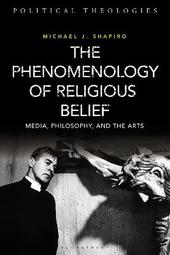
|
The Phenomenology of Religious Belief: Media, Philosophy, and the Arts
Paperback / softback
Main Details
Description
In The Phenomenology of Religious Belief, the renowned philosopher Michael J. Shapiro investigates how art - and in particular literature and film - can impact upon both traditional interpretations and critical studies of religious beliefs and experiences. In doing so, he examines the work of prolific and award-winning writers such as Toni Morrison, Philip K. Dick and Robert Coover. By placing their work in conjunction with critical analyses of media by the likes of Ingmar Bergman and Pier Paolo Pasolini and combining it with the work of groundbreaking thinkers such as George Canguilhem, Giorgio Agamben and Slavoj Zizek, Shapiro takes a truly interdisciplinary approach to the question of how life should be lived. His assessment of phenomenological subjectivity also leads him to question the nature of political theology and extend the criticism of Pauline theology.
Author Biography
Michael J. Shapiro is a professor of Political Science at the University of Hawai'i, Manoa, USA. His books include The Political Sublime (2018), and Punctuations: How the Arts Think the Political (2019).
Reviews"Who is eligible to enter the inexhaustible conversation about how to experience life"? asks Michael Shapiro in this brilliant and wide-ranging book. Like a 21st century William James, Shapiro restages traditional questions of theology in connection with theatricality, cinema, and phenomenology. Focused on "media-involved disruptive events, either actual or imagined," Shapiro moves from scenes of personal despair to worldly challenges like climate change. Following an itinerary both quirky and necessary, the Phenomenology of Religious Belief is a must-read for those working in religious studies, political theory, cinema studies, and phenomenology. * Bonnie Honig, Nancy Duke Lewis Professor, Modern Culture and Media (MCM) and Political Science, Brown University, USA * In this book, apostle Paul, Ingmar Bergman, Philip Dick, and William James hold dialogues about theophanies and the will to believe. Participating in their unexpected encounters brings striking insights in how genres and media impact narratives of religious experience and situate religious communities. A seminal approach to phenomenology of belief. * Martin Nitsche, Institute of Philosophy, Czech Academy of Sciences, Prague *
|